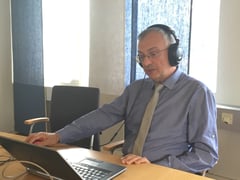Application of QCM-D for In Situ Tracking of Ions Adsorption/ Intercalation-Induced Changes in Gravimetric, Viscoelastic and Hydrodynamic Material Properties of Energy Storage Electrodes
[Recorded webinar]
Potential-induced adsorption of ions into nanoporous carbons, and especially, ions intercalation into porous composite battery electrodes are often accompanied by a significant change in their molar volume causing potential-dependent deformations of the composite electrode consisted of active electrode particles, a conducting additive and polymeric binder. The developed deformations can be accumulated during long-term electrode cycling causing its partial or complete mechanical failure.
Electrochemical QCM-D (EQCM-D), i.e. a combination of commercial QCM-D with a potentiostat/galvanostat for advanced electrochemical research provides direct, inexpensive, highly sensitive area-averaged response during charging and storage of supercapacitors and battery electrodes.
Multiharmonic EQCM-D, i.e. the ability of recording of potential-dependent frequency and dissipation changes on different overtone orders enables a new method of tracking deformations of composite electrode on a mesoscopic scale using the principle of in-situ hydrodynamic spectroscopy and the related quartz crystal admittance modeling (recently reported in Nature Materials 15, 570–575(2016)).
Special attention will be devoted to correct sample fabrication, measurement and model description artifacts, relevance of EQCM-D data to the electrochemical and mechanical processes occurring in practical supercapacitors and rechargeable batteries.
Aired: 29 June 2016 Duration: 50 mins.
Presenter - Prof. MIKHAEL D. LEVI
|
 |